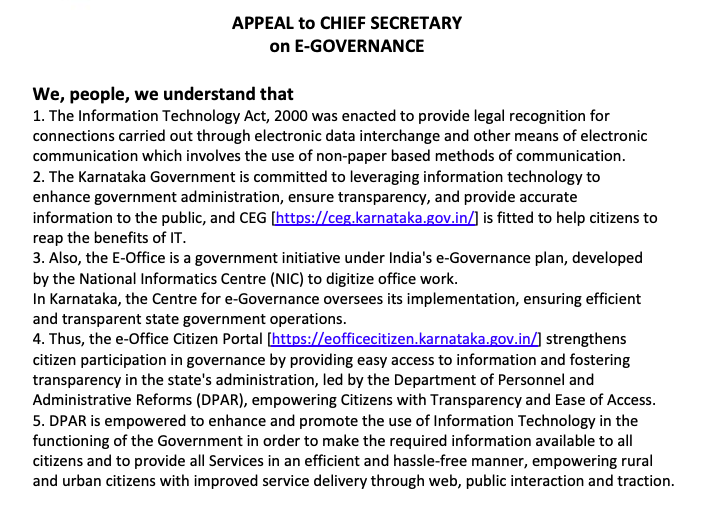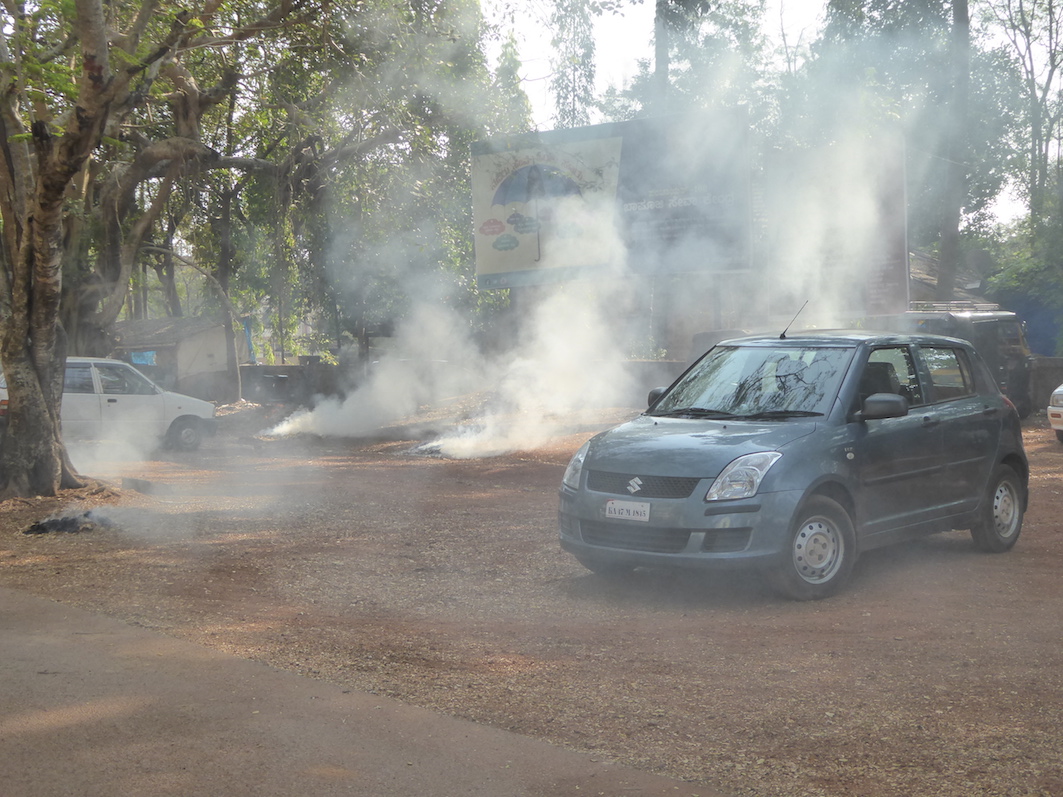We, people, we understand that
1. The Information Technology Act, 2000 was enacted to provide legal recognition for connections carried out through electronic data interchange and other means of electronic communication which involves the use of non-paper based methods of communication.
2. The Karnataka Government is committed to leveraging information technology to enhance government administration, ensure transparency, and provide accurate information to the public, and CEG [https://ceg.karnataka.gov.in/] is fitted to help citizens to reap the benefits of IT.
3. Also, the E-Office is a government initiative under India’s e-Governance plan, developed by the National Informatics Centre (NIC) to digitize office work. In Karnataka, the Centre for e-Governance oversees its implementation, ensuring efficient and transparent state government operations.
4. Thus, the e-Office Citizen Portal [https://eofficecitizen.karnataka.gov.in/] strengthens citizen participation in governance by providing easy access to information and fostering transparency in the state’s administration, led by the Department of Personnel and Administrative Reforms (DPAR), empowering Citizens with Transparency and Ease of Access.
5. DPAR is empowered to enhance and promote the use of Information Technology in the functioning of the Government in order to make the required information available to all citizens and to provide all Services in an efficient and hassle-free manner, empowering rural and urban citizens with improved service delivery through web, public interaction and traction.
We, people, we comprehend that under E-governance basic Rights
1. citizens have the right to access government services and information conveniently, transparently, and efficiently,
2. citizens are provided with easy access to government services and information through
3. citizens are offered transparency in the delivery of government services, allowing them to track their applications and access information related to government operations,
4. citizens have competent custodians of E-Governance (CeG & DPAR), for the implementation and monitoring of its policies and strategies across the State.
We, people, we convey the undergone direct ground experience
1. The E-governance ought to be attended by public servants, dismisses the looked-for interaction, not replying to citizens’ E-mails or communications (such as requests, appeals, representations, petitions, etc.) regarding matters under their duties.
2. Even the Acknowledgment of the received E-postal correspondence is not provided when requested, well witnessed by the lack of service delivery by recipients. Instead, currently, insistence is put to send communication by posting hard copy.
3. The announced priority pro forefront IT proficiency to make official interactions easier and convenient to citizens, is blatantly disregarded, with no reply given by the recipients, frequently also to our RTIs.
4. The citizens’ approach about their concerns through meeting with govt officers at their workplace [scheduled from 3.30 to 5.00pm, as per the Chief Secretary GoK, Circular ಸಂ#ೆ%.&ಆಸುಇ177ಕತವ2024 -ೆಂಗಳ0ರು.23ಾಂಕ:06/09/2024], is utterly ignored and out of reach.
5. Among other Public Services dismiss/ indifference to citizen’s needs, it became a common practice do not reply to the citizens phone calls by the staff of the concerned department leaving them waiting for indefinite time. Or being suggested to go to the office to discuss the sought work.
We, people, we Request directions to be given to all State Departments
1. to aptly respond to the E-mail communications with government offices of citizens, and )their organizations, with an Acknowledgement Receipt and the suitable action initiated being informed in due course.
2. to make available on the website of the liable Department, clear information on the
Status of Applications, permitting Citizens to know the development/action of their Application/letter to the concerned government office.
3. to maintain records (4(1)(a)) and proactively disclose information (4(1)(b)), including organizational details, officer duties, and rules/regulations, on their websites, as stated under the Right to Information (RTI) Act for public authorities.
4. to make well known to citizens, at each official website, and prominently displayed at the offices premises, the schedule [3.30 to 5.00pm] for meetings with govt officers at their workplaces.
5. to devise the telephone call system in a convenient way for citizens, taking into account their basic rights, needs and limitations. Fundamentally instructing a clear, transparent, open and concise communication, focusing on collaboration and problem-solving, emphasizing active listening, using polite and respectful tone, providing required information, feedback and support. Instead of travelling a long distance to the concerned office, citizens communication should be eased and firstly taken over the phone – moving to the office only in extreme cases.
Kumta, 6th April 2025
Arun Shet Secretary



